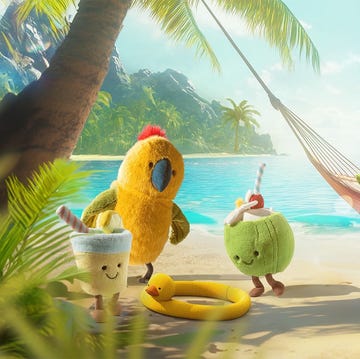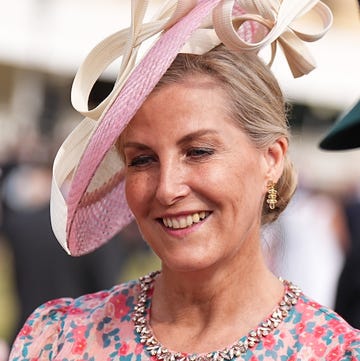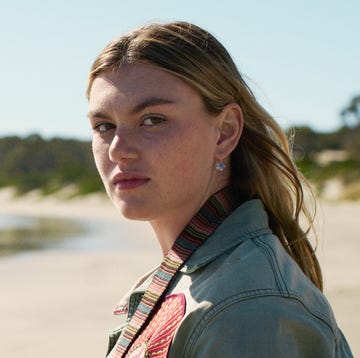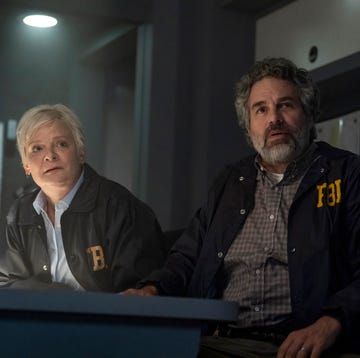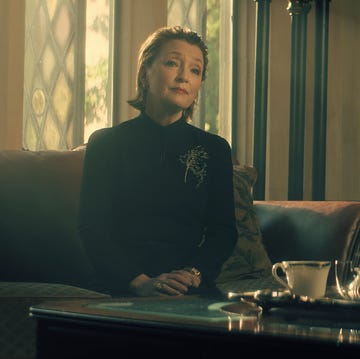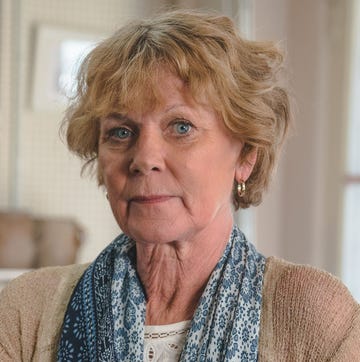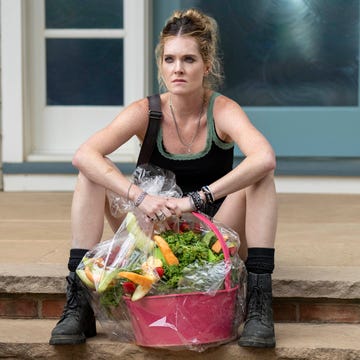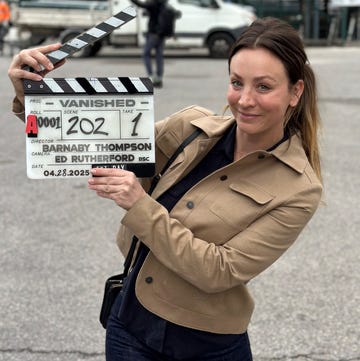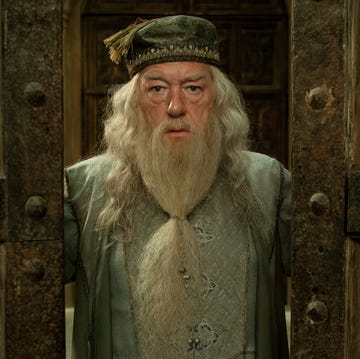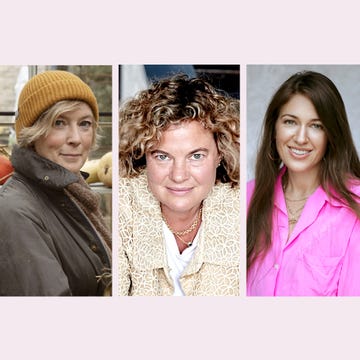Many mothers will know the challenges that come with raising a young child. The exhaustion. The rage. The loss of a sense of self as the demands of parenting set in. But, says Nightbitch director Marielle Heller, we don’t hear this side of motherhood expressed often enough.
“There’s so much of us, as women, that’s conditioned to grin and bear it,” Marielle reflects as we discuss her new film. “And motherhood is one of those things. You’re not really supposed to admit how hard it is, or how complicating it is for your life; you’re just supposed to get on with it.”
It’s a sentiment that’s felt throughout the unapologetically honest scenes in Nightbitch. Adapted from Rachel Yoder’s 2021 novel, Amy Adams plays Mother, an artist turned stay-at-home mum of a toddler, who’s isolated, lonely and exhausted. When her husband (played by Scoot McNairy) casually strolls off to a job that keeps him away for several days at a time, Mother is left in a pit of ever-deepening resentment. “Happiness is a choice,” he tells his wife as he kisses her goodbye on one particularly infuriating occasion.
While Mother loves her son dearly, her world rapidly shrinks, becoming a repetitive cycle of playdates and countless readings of Goodnight, Goodnight, Construction Site. So, too, does her sense of identity, and thus begins a transformation. Hair sprouts in unusual places; her sense of smell becomes heightened; her teeth become sharper: Mother begins to turn into a dog. Bizarre, perhaps, but for Mother, her new canine nature is freeing. If you’re a mother, you’ll get it; if you’re not, I should warn you, you may think twice about becoming one.
Here, Marielle explains what compelled her to make the film and why she feels it’s so important to change the narrative around motherhood.
Nightbitch gives a brutally honest portrayal of being a mother. Are there versions of motherhood that you wanted to subvert with this film?
Yes, definitely. When I became a mother, I realised that I hadn’t really seen it depicted in a complete and honest way. And when I read Rachel Yoder’s book, I was like: “Oh, finally, someone’s saying all the things that many of us are feeling but we’re not supposed to say.” All the complicated feelings around this experience of transforming into a new person and all the dichotomies that come together. Like the fact that you can still love your child and, at times, be so bored by the monotony of mothering; how lonesome the entire situation can feel and how joyful it can feel at the same time. It’s also the feeling that you’ve lost a sense of who you used to be and you’re mourning the version of yourself that once existed.
Was the contradiction between selfhood and parenthood something you grappled with when you became a mother?
Absolutely. I think a lot of us go through a moment where you’re suddenly introducing yourself as your child’s mum and it’s almost like you don’t even have your own name anymore. In one way, there’s something kind of freeing about that, but you also start to lose a sense of who you are separate from your child. And there’s a feeling that you may never be them again.
How do you think women can come to terms with that?
I think we just have to be honest about it. The truth is that we go through many transitions in our lives – it might be ageing or menopause, where there’s a loss of that self who was a young, fertile woman. You constantly have to mourn the loss of your previous self, whether you become a parent or not. But with motherhood, it happens so fast and once it happens, there’s sort of no going back.
Why do you think so much remains unsaid?
There’s a version of motherhood that we’re sold – how it’s going to look and how it’s going to feel – and if you express anything but that, you’re somehow seen as ungrateful, which is a very toxic idea for women. Instead, you have to conform to this very happy, lucky-to-be-here attitude about motherhood. But that’s not a full version of the experience.
You wrote the script for Nightbitch while alone at home with your two kids. How did that inform your writing?
Oh, it was so cathartic because I could just take all my frustrations and think: “That’s okay, I’ll write about these later.” When I first became a mother, it was so all-consuming. But because this was my second time experiencing life with a young baby, I was fortunately able to find things slightly more humorous. I knew how fleeting it was and I had a little more distance and perspective about the whole thing, so I could find it absurd and funny in a different kind of way.
Which of your own experiences made it into the film?
There are so many things in the movie that came from my life, or from my dearest friends’ lives. Like the boy [Mother’s son] putting poop in his hand and showing it to his mum – that came from a good friend of mine. And the scene where the husband doesn’t know how to make coffee and asks how many scoops he needs… When my husband read that scene, he was like: “Okay, screw you. I know how to make coffee. Come on!” He knew I’d written it about him and about the ways in which I feel like I end up becoming the manager of our house.
What’s the best piece of advice you received when you became a mother?
To just trust my own instincts and that I’d know best what my kid needed. It’s really easy to get bombarded with all the things you’re doing wrong or what you should be doing. It’s all the: “This is what you need to do to get them to sleep” and “This is how you should feed them”. The more you can trust your own instincts and block out that noise, even if it takes a little while, the better.
In the film, we see Mother’s maternal instincts begin to manifest in canine form. What’s the true meaning behind that transformation?
The way I thought of it is that Mother’s rage has gone unchecked and repressed for so long that it has to burst out in her “Nightbitch-ness”. And it’s only when she’s able to integrate her rage into her life that Nightbitch can recess into the background. I think there’s a bit of a boiling point happening right now around rage and women’s bodies and the ways we’ve been repressed or told to act a certain way – and we’re going to see a lot more of it in mainstream culture, which is a very positive thing.
We also see Mother at several points encouraging her child to be a dog with her. What was the significance of that to you?
We get so caught up with what we should be doing with parenting that we lose our ability to play. I loved that as Mother became a dog, she actually got more in touch with the joys of parenting. She was less stuck in what she should be doing, and she got down on the floor and began connecting with her kid in a real way. I think that’s such a beautiful sentiment. The moments in my life when I’ve stopped caring how it looked, or if I was doing it right, and just been really present with my kids are the times I’ve been the happiest.
Would you recommend motherhood to a woman who isn’t sure she wants to do it?
No! You have to be 100% sure you want a child to do it, and truthfully? I don’t think everybody needs to be a parent. I was so sure from the time I was a little kid that I wanted to be a mum, and I worked with kids for years and years – I was a babysitter and a camp counsellor. I thought: “Who could be more prepared than me?” – and I still wasn’t prepared for it. The weight of the responsibility was really mind-blowing. I just couldn’t believe how overwhelming that sense of never being off the clock, never being able to relax was – especially for those first few years, where it feels like it’s your life’s work just to keep a baby alive.
What advice would you give to a first-time mother now?
Find a group of people who are going through the same thing as you and form a community. It’s so important to seek out parents who are experiencing similar things, so that you can share every detail with each other and feel less alone.
Nightbitch will be released in UK and Ireland cinemas on 6 December.




